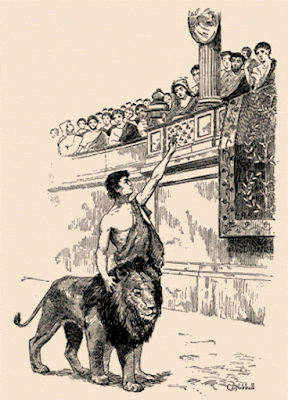affectus, -ūs [4/m]: mood; emotion
animus, -ī [2/m]: has many meanings e.g. life, soul but, in
this context, “mind”
It’s one of these words which take a bit of thought when
translating from Latin:
https://en.wiktionary.org/wiki/animus#Latin
cattus, -ī [2/m] is a Late Latin / Mediaeval Latin word, the
origins of which are unclear. It is an example of a Wanderwort, a
wandering word that appears in different languages possibly through trade.
Classical Latin: fēlēs, -is [3/f]
[1] cūriōsus, -a, -um
The suffix –(i)ōsus is added to nouns to convey “full of”
(whatever the noun is) i.e. cūra, -ae [1/f]: care; attention > curiōsus,
-a, -um: [i] careful [ii] curious
lacrima, -ae [1/f]: tear > lacrimōsus, -a, -um:
weeping [= full of tears]
ventus, -ī [2/m]: wind > ventōsus, -a, -um: windy
[= full of wind]
The ending, again often through French, ends up in English
derivatives:
ambitiō, ambitiōnis [3/f]: desire for popularity > ambitiōsus,
-a, -um > Engl. ambitious
glōria, -ae [1/f]: glory > glōriōsus, -a, -um >
Engl. glorious
lūmen, lūminis [3/n]: light > lūminōsus, -a, -um
> Engl. luminous
nervus, -ī [2/m]: [i] (physical) sinew; tendon; nerve >
nervōsus, -a, -um > Engl. nervous
Note:
[i] Some English derivatives ending in –(i)ous were taken
directly from Latin adjectives which did not have -ōsus, three of which are in
the list:
ānxius, -a, -um > Engl. anxious
cautus, -a, -um > Engl. careful; cautious
sollicitus, -a, -um: worried > Engl. solicitous
(showing care or concern)
Further examples:
ātrox, ātrocis: fierce, cruel > Engl. atrocious
vorāx, vorācis: gluttonous > Engl. voracious
[ii] The other point to look out for is that original Latin words
often had wider meanings than the English derivatives, for example:
genus, generis [3/n]: birth; origin > generōsus, -a, -um:
[i] well-born; well-bred [ii] generous > Engl: generous i.e. the English
meaning is narrower than the original Latin.
[2] amīcus can be both and a noun and an adjective
[i] amīcus, -ī [2/m]: friend
[ii] amīcus, -a, -um: friendly
The opposite of both the adjective and the noun is [i] inimīcus,
-ī [2/m]: enemy and [ii] inimīcus, -a, -um: hostile; note that Latin
makes a distinction between hostis, -is [3/m]: enemy, in the sense of a
military enemy, whereas inimīcus refers to a personal enemy
The prefix in- in Latin can create opposites:
cautus, -a, -um: cautious; careful │ incautus, -a,
-um: incautious; careless
grātus, -a, -um: pleasing; grateful │ ingrātus, -a,
-um: disagreeable; ungrateful
Again, look at grātus which may mean ‘grateful’ but
can have other meanings such as ‘pleasing’ or ‘acceptable’. This is something
of which you need to be aware when dealing with any English derivatives of
Latin i.e. the meaning in context may not be what immediately springs to mind
when you first see the word.
[3] per- is a prefix which intensifies the meaning of the
root word:
territus, -a, -um: frightened > perterritus, -a,
-um: (thoroughly) frightened
multī, -ae, -a: many > permultī, -ae, -a: very
many






























